Psychological Theories Application in Humanitarian & Community Studies
VerifiedAdded on 2023/06/07
|10
|2382
|413
Essay
AI Summary
This essay examines the application of psychological theories, specifically Social Identity Theory and Eco-cultural and Sociocultural Theory, within the context of humanitarian and community studies. It discusses how these theories explain behaviors related to social classification, cultural influences on learning, and individual adaptation to environmental and social contexts. The essay further explores how these theories can be used to improve understanding of social dynamics, reduce prejudice, and enhance individual well-being within communities. It emphasizes the importance of considering both individual and collective factors in addressing challenges and promoting positive outcomes in humanitarian and community work. The essay concludes by highlighting the potential of these psychological frameworks to inform interventions and strategies aimed at fostering resilience, cultural sensitivity, and social cohesion in diverse populations.
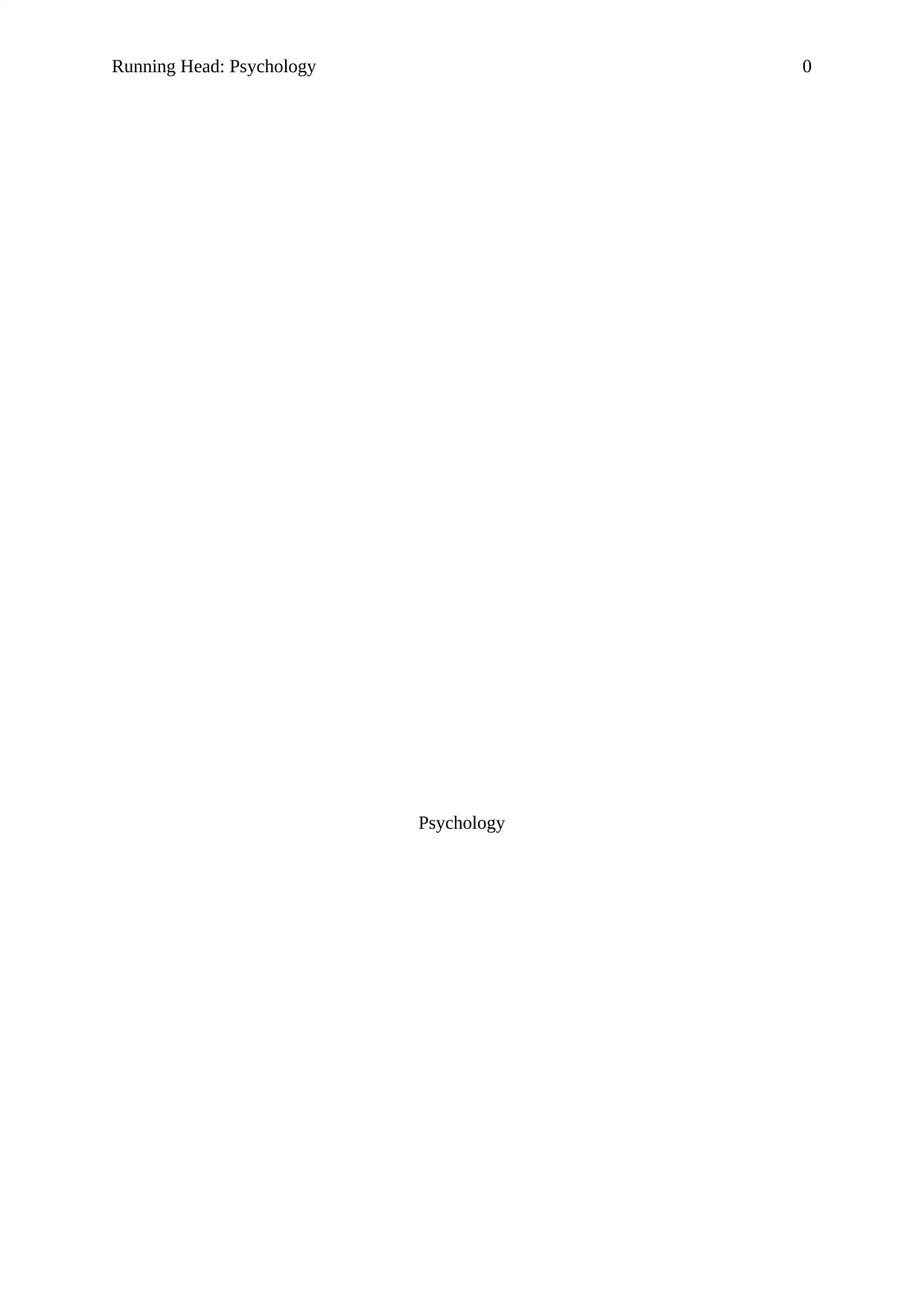
Running Head: Psychology 0
Psychology
Psychology
Paraphrase This Document
Need a fresh take? Get an instant paraphrase of this document with our AI Paraphraser
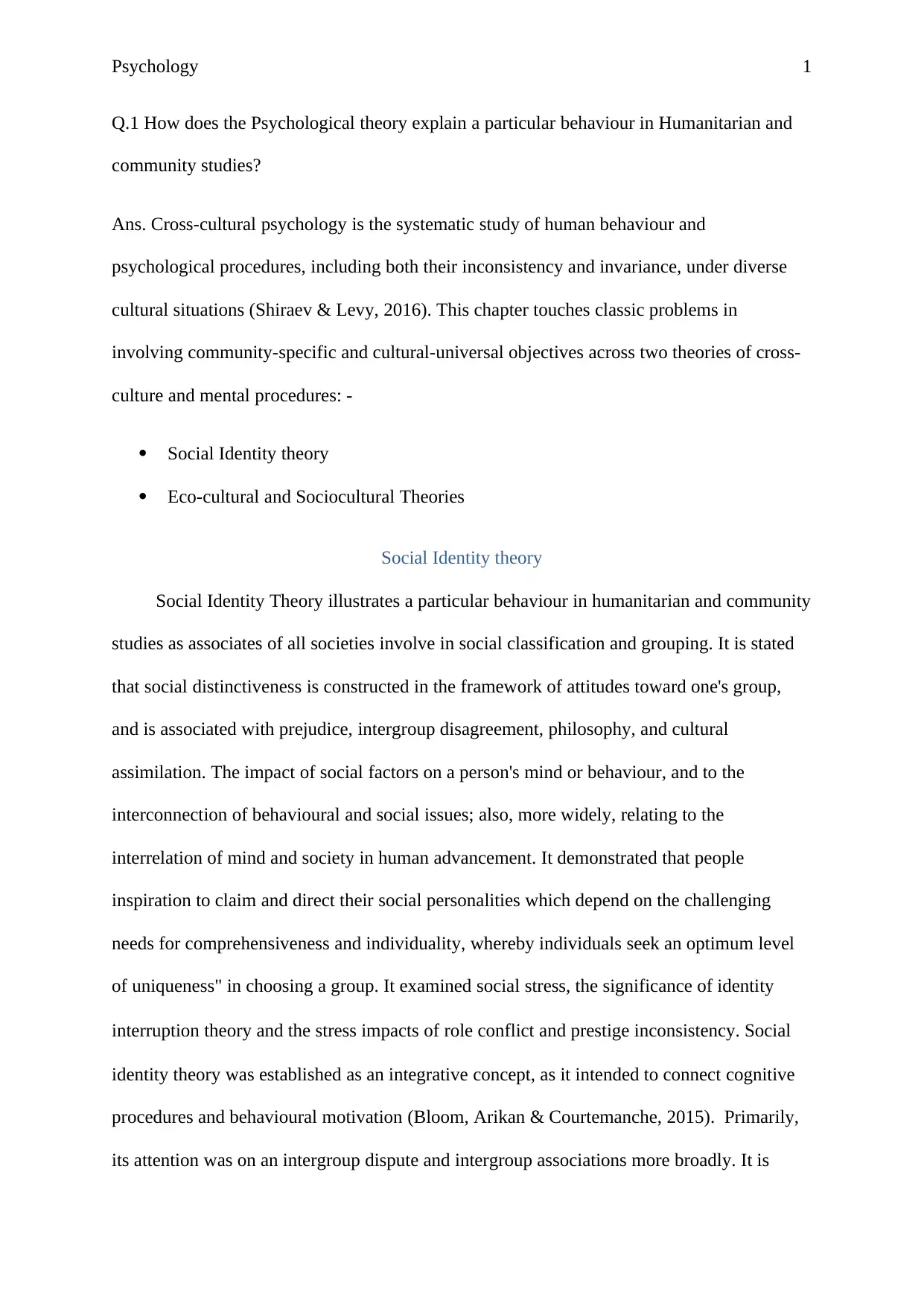
Psychology 1
Q.1 How does the Psychological theory explain a particular behaviour in Humanitarian and
community studies?
Ans. Cross-cultural psychology is the systematic study of human behaviour and
psychological procedures, including both their inconsistency and invariance, under diverse
cultural situations (Shiraev & Levy, 2016). This chapter touches classic problems in
involving community-specific and cultural-universal objectives across two theories of cross-
culture and mental procedures: -
Social Identity theory
Eco-cultural and Sociocultural Theories
Social Identity theory
Social Identity Theory illustrates a particular behaviour in humanitarian and community
studies as associates of all societies involve in social classification and grouping. It is stated
that social distinctiveness is constructed in the framework of attitudes toward one's group,
and is associated with prejudice, intergroup disagreement, philosophy, and cultural
assimilation. The impact of social factors on a person's mind or behaviour, and to the
interconnection of behavioural and social issues; also, more widely, relating to the
interrelation of mind and society in human advancement. It demonstrated that people
inspiration to claim and direct their social personalities which depend on the challenging
needs for comprehensiveness and individuality, whereby individuals seek an optimum level
of uniqueness" in choosing a group. It examined social stress, the significance of identity
interruption theory and the stress impacts of role conflict and prestige inconsistency. Social
identity theory was established as an integrative concept, as it intended to connect cognitive
procedures and behavioural motivation (Bloom, Arikan & Courtemanche, 2015). Primarily,
its attention was on an intergroup dispute and intergroup associations more broadly. It is
Q.1 How does the Psychological theory explain a particular behaviour in Humanitarian and
community studies?
Ans. Cross-cultural psychology is the systematic study of human behaviour and
psychological procedures, including both their inconsistency and invariance, under diverse
cultural situations (Shiraev & Levy, 2016). This chapter touches classic problems in
involving community-specific and cultural-universal objectives across two theories of cross-
culture and mental procedures: -
Social Identity theory
Eco-cultural and Sociocultural Theories
Social Identity theory
Social Identity Theory illustrates a particular behaviour in humanitarian and community
studies as associates of all societies involve in social classification and grouping. It is stated
that social distinctiveness is constructed in the framework of attitudes toward one's group,
and is associated with prejudice, intergroup disagreement, philosophy, and cultural
assimilation. The impact of social factors on a person's mind or behaviour, and to the
interconnection of behavioural and social issues; also, more widely, relating to the
interrelation of mind and society in human advancement. It demonstrated that people
inspiration to claim and direct their social personalities which depend on the challenging
needs for comprehensiveness and individuality, whereby individuals seek an optimum level
of uniqueness" in choosing a group. It examined social stress, the significance of identity
interruption theory and the stress impacts of role conflict and prestige inconsistency. Social
identity theory was established as an integrative concept, as it intended to connect cognitive
procedures and behavioural motivation (Bloom, Arikan & Courtemanche, 2015). Primarily,
its attention was on an intergroup dispute and intergroup associations more broadly. It is
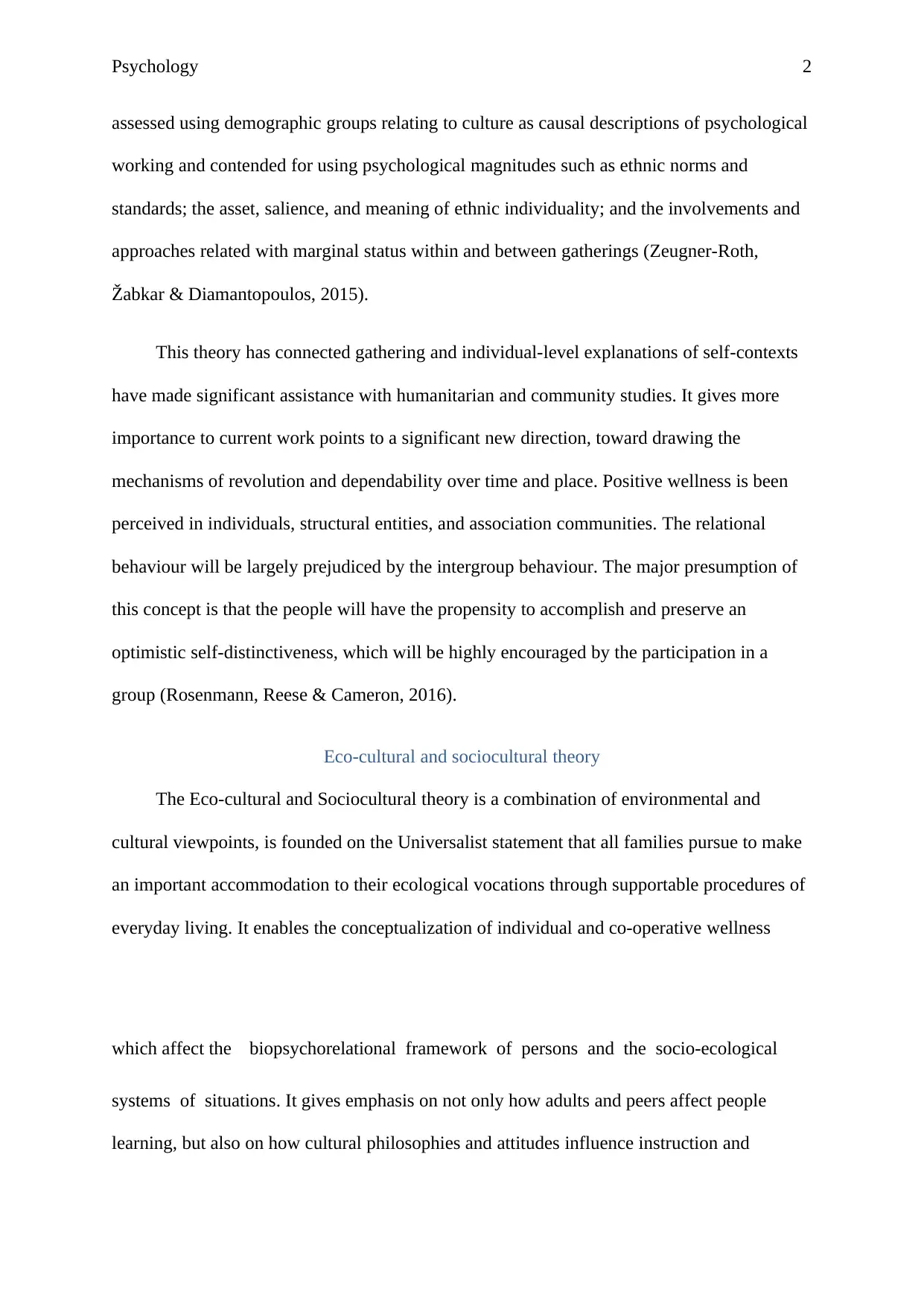
Psychology 2
assessed using demographic groups relating to culture as causal descriptions of psychological
working and contended for using psychological magnitudes such as ethnic norms and
standards; the asset, salience, and meaning of ethnic individuality; and the involvements and
approaches related with marginal status within and between gatherings (Zeugner-Roth,
Žabkar & Diamantopoulos, 2015).
This theory has connected gathering and individual-level explanations of self-contexts
have made significant assistance with humanitarian and community studies. It gives more
importance to current work points to a significant new direction, toward drawing the
mechanisms of revolution and dependability over time and place. Positive wellness is been
perceived in individuals, structural entities, and association communities. The relational
behaviour will be largely prejudiced by the intergroup behaviour. The major presumption of
this concept is that the people will have the propensity to accomplish and preserve an
optimistic self-distinctiveness, which will be highly encouraged by the participation in a
group (Rosenmann, Reese & Cameron, 2016).
Eco-cultural and sociocultural theory
The Eco-cultural and Sociocultural theory is a combination of environmental and
cultural viewpoints, is founded on the Universalist statement that all families pursue to make
an important accommodation to their ecological vocations through supportable procedures of
everyday living. It enables the conceptualization of individual and co-operative wellness
which affect the biopsychorelational framework of persons and the socio-ecological
systems of situations. It gives emphasis on not only how adults and peers affect people
learning, but also on how cultural philosophies and attitudes influence instruction and
assessed using demographic groups relating to culture as causal descriptions of psychological
working and contended for using psychological magnitudes such as ethnic norms and
standards; the asset, salience, and meaning of ethnic individuality; and the involvements and
approaches related with marginal status within and between gatherings (Zeugner-Roth,
Žabkar & Diamantopoulos, 2015).
This theory has connected gathering and individual-level explanations of self-contexts
have made significant assistance with humanitarian and community studies. It gives more
importance to current work points to a significant new direction, toward drawing the
mechanisms of revolution and dependability over time and place. Positive wellness is been
perceived in individuals, structural entities, and association communities. The relational
behaviour will be largely prejudiced by the intergroup behaviour. The major presumption of
this concept is that the people will have the propensity to accomplish and preserve an
optimistic self-distinctiveness, which will be highly encouraged by the participation in a
group (Rosenmann, Reese & Cameron, 2016).
Eco-cultural and sociocultural theory
The Eco-cultural and Sociocultural theory is a combination of environmental and
cultural viewpoints, is founded on the Universalist statement that all families pursue to make
an important accommodation to their ecological vocations through supportable procedures of
everyday living. It enables the conceptualization of individual and co-operative wellness
which affect the biopsychorelational framework of persons and the socio-ecological
systems of situations. It gives emphasis on not only how adults and peers affect people
learning, but also on how cultural philosophies and attitudes influence instruction and
⊘ This is a preview!⊘
Do you want full access?
Subscribe today to unlock all pages.

Trusted by 1+ million students worldwide
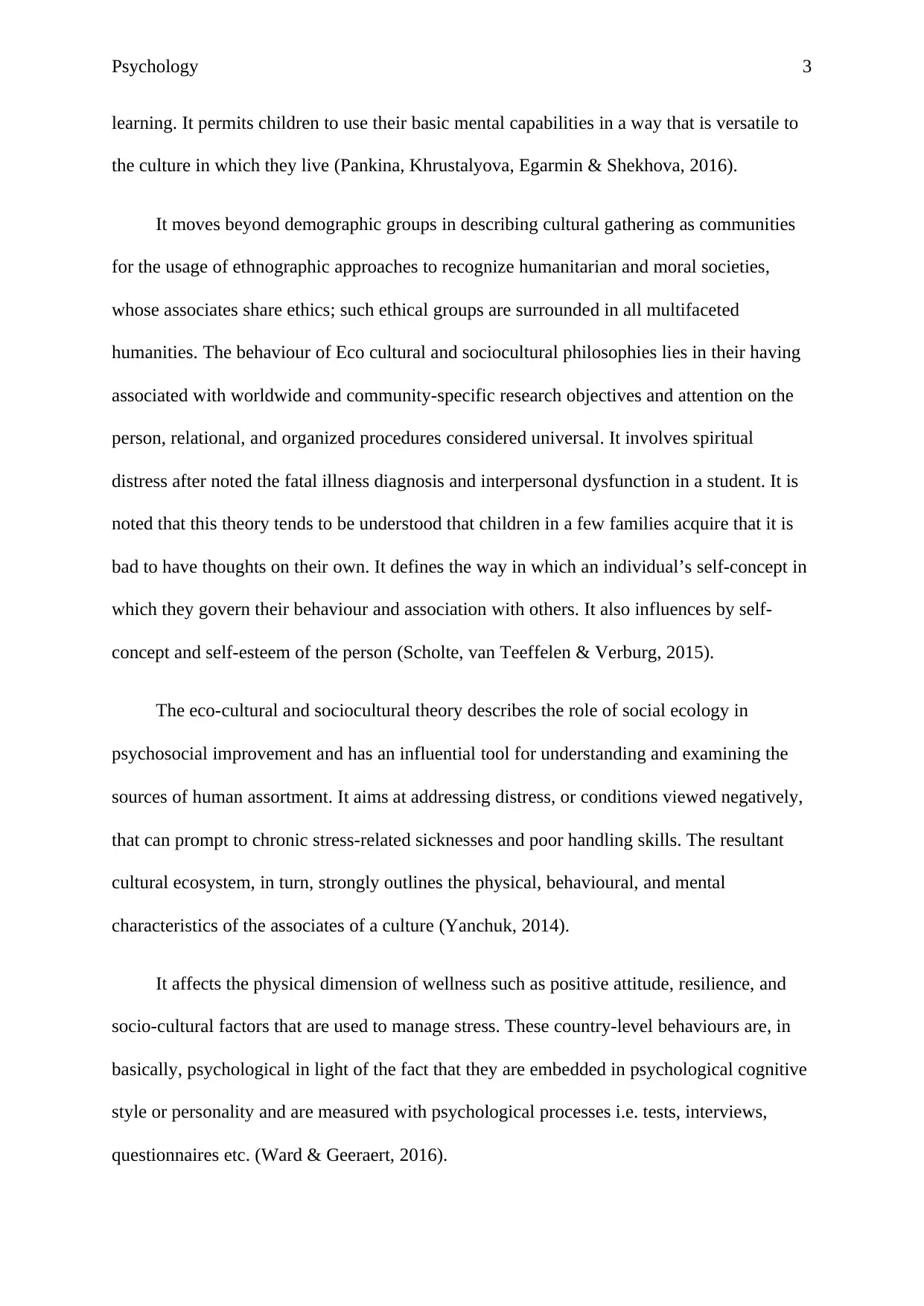
Psychology 3
learning. It permits children to use their basic mental capabilities in a way that is versatile to
the culture in which they live (Pankina, Khrustalyova, Egarmin & Shekhova, 2016).
It moves beyond demographic groups in describing cultural gathering as communities
for the usage of ethnographic approaches to recognize humanitarian and moral societies,
whose associates share ethics; such ethical groups are surrounded in all multifaceted
humanities. The behaviour of Eco cultural and sociocultural philosophies lies in their having
associated with worldwide and community-specific research objectives and attention on the
person, relational, and organized procedures considered universal. It involves spiritual
distress after noted the fatal illness diagnosis and interpersonal dysfunction in a student. It is
noted that this theory tends to be understood that children in a few families acquire that it is
bad to have thoughts on their own. It defines the way in which an individual’s self-concept in
which they govern their behaviour and association with others. It also influences by self-
concept and self-esteem of the person (Scholte, van Teeffelen & Verburg, 2015).
The eco-cultural and sociocultural theory describes the role of social ecology in
psychosocial improvement and has an influential tool for understanding and examining the
sources of human assortment. It aims at addressing distress, or conditions viewed negatively,
that can prompt to chronic stress-related sicknesses and poor handling skills. The resultant
cultural ecosystem, in turn, strongly outlines the physical, behavioural, and mental
characteristics of the associates of a culture (Yanchuk, 2014).
It affects the physical dimension of wellness such as positive attitude, resilience, and
socio-cultural factors that are used to manage stress. These country-level behaviours are, in
basically, psychological in light of the fact that they are embedded in psychological cognitive
style or personality and are measured with psychological processes i.e. tests, interviews,
questionnaires etc. (Ward & Geeraert, 2016).
learning. It permits children to use their basic mental capabilities in a way that is versatile to
the culture in which they live (Pankina, Khrustalyova, Egarmin & Shekhova, 2016).
It moves beyond demographic groups in describing cultural gathering as communities
for the usage of ethnographic approaches to recognize humanitarian and moral societies,
whose associates share ethics; such ethical groups are surrounded in all multifaceted
humanities. The behaviour of Eco cultural and sociocultural philosophies lies in their having
associated with worldwide and community-specific research objectives and attention on the
person, relational, and organized procedures considered universal. It involves spiritual
distress after noted the fatal illness diagnosis and interpersonal dysfunction in a student. It is
noted that this theory tends to be understood that children in a few families acquire that it is
bad to have thoughts on their own. It defines the way in which an individual’s self-concept in
which they govern their behaviour and association with others. It also influences by self-
concept and self-esteem of the person (Scholte, van Teeffelen & Verburg, 2015).
The eco-cultural and sociocultural theory describes the role of social ecology in
psychosocial improvement and has an influential tool for understanding and examining the
sources of human assortment. It aims at addressing distress, or conditions viewed negatively,
that can prompt to chronic stress-related sicknesses and poor handling skills. The resultant
cultural ecosystem, in turn, strongly outlines the physical, behavioural, and mental
characteristics of the associates of a culture (Yanchuk, 2014).
It affects the physical dimension of wellness such as positive attitude, resilience, and
socio-cultural factors that are used to manage stress. These country-level behaviours are, in
basically, psychological in light of the fact that they are embedded in psychological cognitive
style or personality and are measured with psychological processes i.e. tests, interviews,
questionnaires etc. (Ward & Geeraert, 2016).
Paraphrase This Document
Need a fresh take? Get an instant paraphrase of this document with our AI Paraphraser
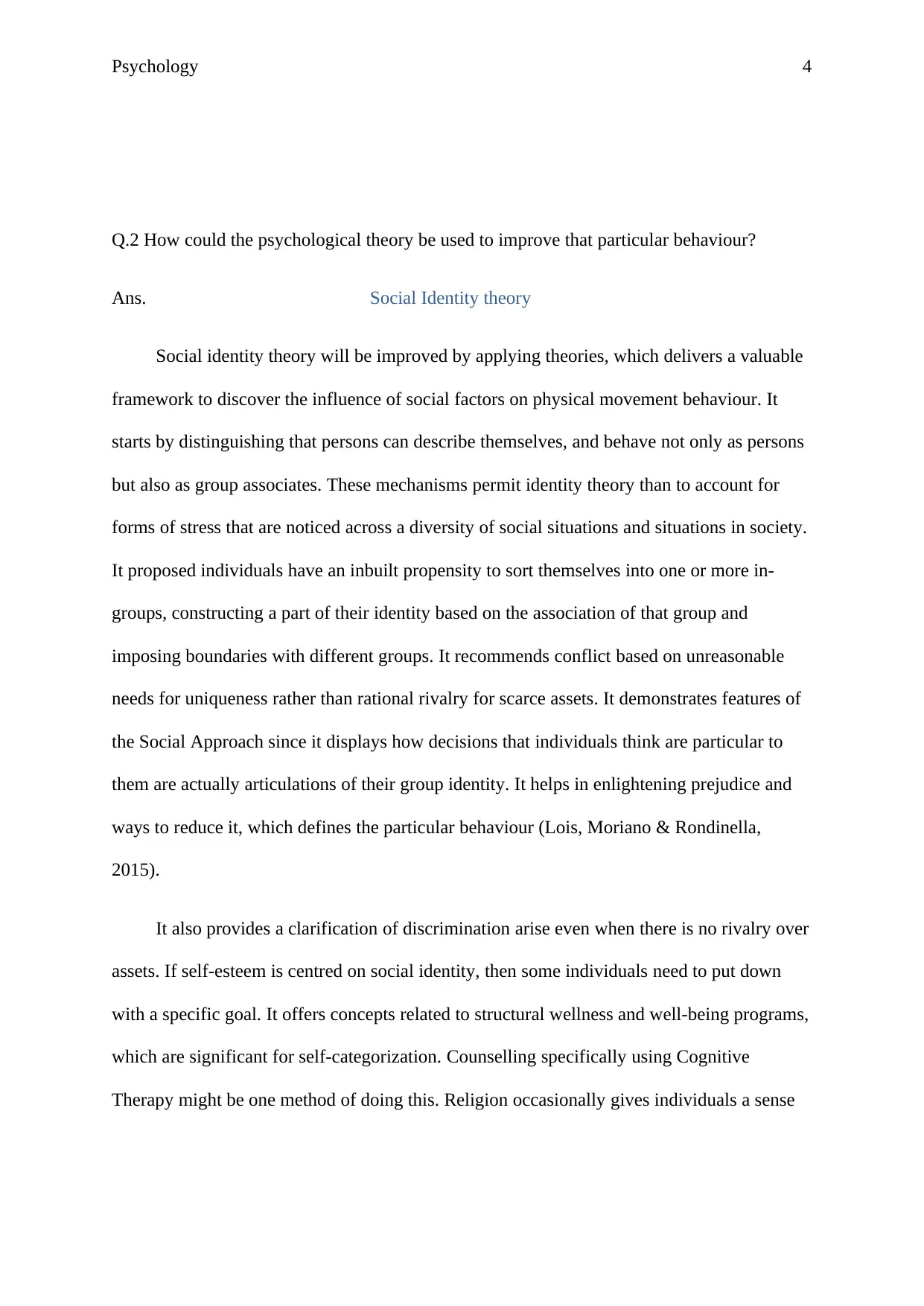
Psychology 4
Q.2 How could the psychological theory be used to improve that particular behaviour?
Ans. Social Identity theory
Social identity theory will be improved by applying theories, which delivers a valuable
framework to discover the influence of social factors on physical movement behaviour. It
starts by distinguishing that persons can describe themselves, and behave not only as persons
but also as group associates. These mechanisms permit identity theory than to account for
forms of stress that are noticed across a diversity of social situations and situations in society.
It proposed individuals have an inbuilt propensity to sort themselves into one or more in-
groups, constructing a part of their identity based on the association of that group and
imposing boundaries with different groups. It recommends conflict based on unreasonable
needs for uniqueness rather than rational rivalry for scarce assets. It demonstrates features of
the Social Approach since it displays how decisions that individuals think are particular to
them are actually articulations of their group identity. It helps in enlightening prejudice and
ways to reduce it, which defines the particular behaviour (Lois, Moriano & Rondinella,
2015).
It also provides a clarification of discrimination arise even when there is no rivalry over
assets. If self-esteem is centred on social identity, then some individuals need to put down
with a specific goal. It offers concepts related to structural wellness and well-being programs,
which are significant for self-categorization. Counselling specifically using Cognitive
Therapy might be one method of doing this. Religion occasionally gives individuals a sense
Q.2 How could the psychological theory be used to improve that particular behaviour?
Ans. Social Identity theory
Social identity theory will be improved by applying theories, which delivers a valuable
framework to discover the influence of social factors on physical movement behaviour. It
starts by distinguishing that persons can describe themselves, and behave not only as persons
but also as group associates. These mechanisms permit identity theory than to account for
forms of stress that are noticed across a diversity of social situations and situations in society.
It proposed individuals have an inbuilt propensity to sort themselves into one or more in-
groups, constructing a part of their identity based on the association of that group and
imposing boundaries with different groups. It recommends conflict based on unreasonable
needs for uniqueness rather than rational rivalry for scarce assets. It demonstrates features of
the Social Approach since it displays how decisions that individuals think are particular to
them are actually articulations of their group identity. It helps in enlightening prejudice and
ways to reduce it, which defines the particular behaviour (Lois, Moriano & Rondinella,
2015).
It also provides a clarification of discrimination arise even when there is no rivalry over
assets. If self-esteem is centred on social identity, then some individuals need to put down
with a specific goal. It offers concepts related to structural wellness and well-being programs,
which are significant for self-categorization. Counselling specifically using Cognitive
Therapy might be one method of doing this. Religion occasionally gives individuals a sense
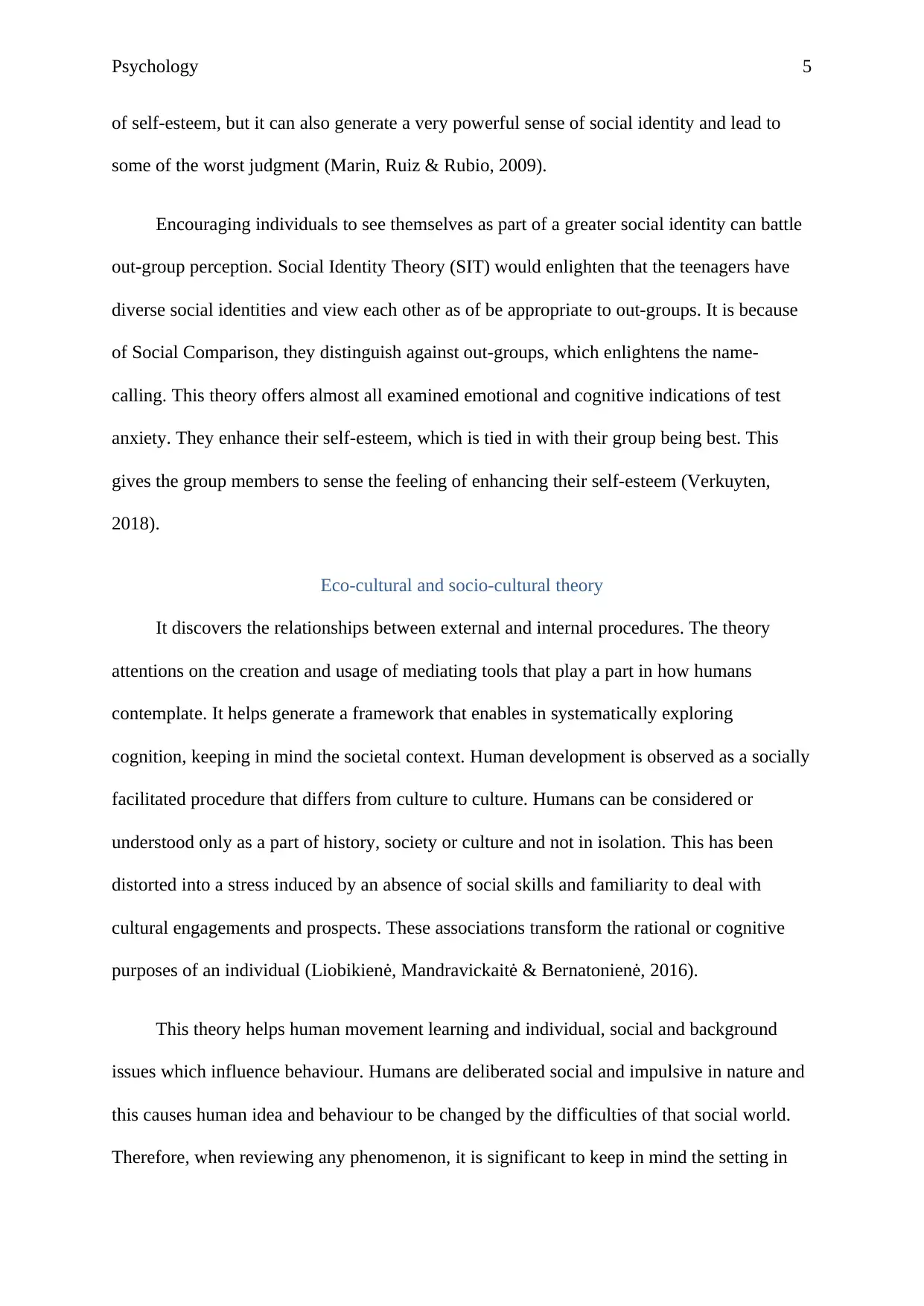
Psychology 5
of self-esteem, but it can also generate a very powerful sense of social identity and lead to
some of the worst judgment (Marin, Ruiz & Rubio, 2009).
Encouraging individuals to see themselves as part of a greater social identity can battle
out-group perception. Social Identity Theory (SIT) would enlighten that the teenagers have
diverse social identities and view each other as of be appropriate to out-groups. It is because
of Social Comparison, they distinguish against out-groups, which enlightens the name-
calling. This theory offers almost all examined emotional and cognitive indications of test
anxiety. They enhance their self-esteem, which is tied in with their group being best. This
gives the group members to sense the feeling of enhancing their self-esteem (Verkuyten,
2018).
Eco-cultural and socio-cultural theory
It discovers the relationships between external and internal procedures. The theory
attentions on the creation and usage of mediating tools that play a part in how humans
contemplate. It helps generate a framework that enables in systematically exploring
cognition, keeping in mind the societal context. Human development is observed as a socially
facilitated procedure that differs from culture to culture. Humans can be considered or
understood only as a part of history, society or culture and not in isolation. This has been
distorted into a stress induced by an absence of social skills and familiarity to deal with
cultural engagements and prospects. These associations transform the rational or cognitive
purposes of an individual (Liobikienė, Mandravickaitė & Bernatonienė, 2016).
This theory helps human movement learning and individual, social and background
issues which influence behaviour. Humans are deliberated social and impulsive in nature and
this causes human idea and behaviour to be changed by the difficulties of that social world.
Therefore, when reviewing any phenomenon, it is significant to keep in mind the setting in
of self-esteem, but it can also generate a very powerful sense of social identity and lead to
some of the worst judgment (Marin, Ruiz & Rubio, 2009).
Encouraging individuals to see themselves as part of a greater social identity can battle
out-group perception. Social Identity Theory (SIT) would enlighten that the teenagers have
diverse social identities and view each other as of be appropriate to out-groups. It is because
of Social Comparison, they distinguish against out-groups, which enlightens the name-
calling. This theory offers almost all examined emotional and cognitive indications of test
anxiety. They enhance their self-esteem, which is tied in with their group being best. This
gives the group members to sense the feeling of enhancing their self-esteem (Verkuyten,
2018).
Eco-cultural and socio-cultural theory
It discovers the relationships between external and internal procedures. The theory
attentions on the creation and usage of mediating tools that play a part in how humans
contemplate. It helps generate a framework that enables in systematically exploring
cognition, keeping in mind the societal context. Human development is observed as a socially
facilitated procedure that differs from culture to culture. Humans can be considered or
understood only as a part of history, society or culture and not in isolation. This has been
distorted into a stress induced by an absence of social skills and familiarity to deal with
cultural engagements and prospects. These associations transform the rational or cognitive
purposes of an individual (Liobikienė, Mandravickaitė & Bernatonienė, 2016).
This theory helps human movement learning and individual, social and background
issues which influence behaviour. Humans are deliberated social and impulsive in nature and
this causes human idea and behaviour to be changed by the difficulties of that social world.
Therefore, when reviewing any phenomenon, it is significant to keep in mind the setting in
⊘ This is a preview!⊘
Do you want full access?
Subscribe today to unlock all pages.

Trusted by 1+ million students worldwide
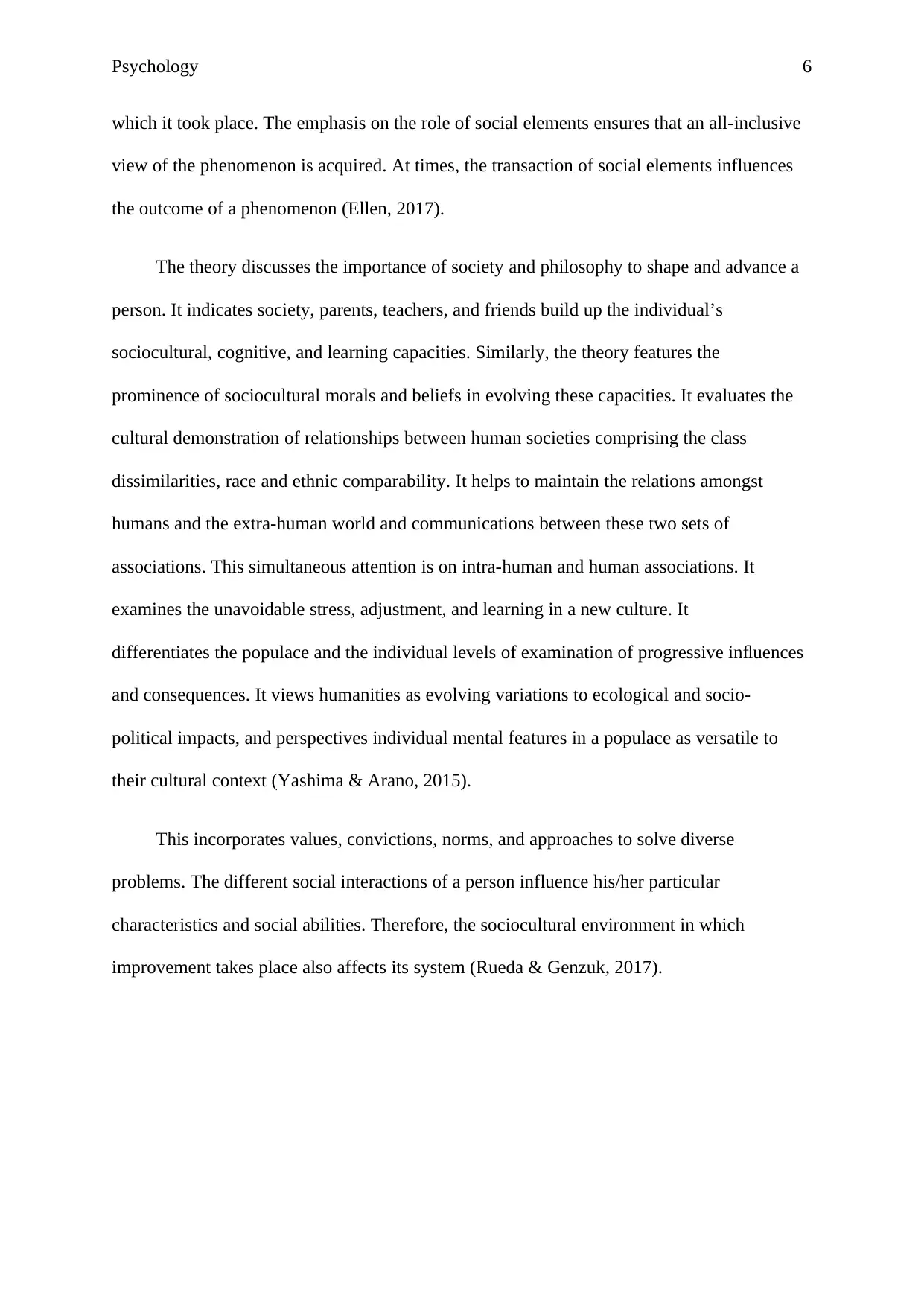
Psychology 6
which it took place. The emphasis on the role of social elements ensures that an all-inclusive
view of the phenomenon is acquired. At times, the transaction of social elements influences
the outcome of a phenomenon (Ellen, 2017).
The theory discusses the importance of society and philosophy to shape and advance a
person. It indicates society, parents, teachers, and friends build up the individual’s
sociocultural, cognitive, and learning capacities. Similarly, the theory features the
prominence of sociocultural morals and beliefs in evolving these capacities. It evaluates the
cultural demonstration of relationships between human societies comprising the class
dissimilarities, race and ethnic comparability. It helps to maintain the relations amongst
humans and the extra-human world and communications between these two sets of
associations. This simultaneous attention is on intra-human and human associations. It
examines the unavoidable stress, adjustment, and learning in a new culture. It
differentiates the populace and the individual levels of examination of progressive influences
and consequences. It views humanities as evolving variations to ecological and socio-
political impacts, and perspectives individual mental features in a populace as versatile to
their cultural context (Yashima & Arano, 2015).
This incorporates values, convictions, norms, and approaches to solve diverse
problems. The different social interactions of a person influence his/her particular
characteristics and social abilities. Therefore, the sociocultural environment in which
improvement takes place also affects its system (Rueda & Genzuk, 2017).
which it took place. The emphasis on the role of social elements ensures that an all-inclusive
view of the phenomenon is acquired. At times, the transaction of social elements influences
the outcome of a phenomenon (Ellen, 2017).
The theory discusses the importance of society and philosophy to shape and advance a
person. It indicates society, parents, teachers, and friends build up the individual’s
sociocultural, cognitive, and learning capacities. Similarly, the theory features the
prominence of sociocultural morals and beliefs in evolving these capacities. It evaluates the
cultural demonstration of relationships between human societies comprising the class
dissimilarities, race and ethnic comparability. It helps to maintain the relations amongst
humans and the extra-human world and communications between these two sets of
associations. This simultaneous attention is on intra-human and human associations. It
examines the unavoidable stress, adjustment, and learning in a new culture. It
differentiates the populace and the individual levels of examination of progressive influences
and consequences. It views humanities as evolving variations to ecological and socio-
political impacts, and perspectives individual mental features in a populace as versatile to
their cultural context (Yashima & Arano, 2015).
This incorporates values, convictions, norms, and approaches to solve diverse
problems. The different social interactions of a person influence his/her particular
characteristics and social abilities. Therefore, the sociocultural environment in which
improvement takes place also affects its system (Rueda & Genzuk, 2017).
Paraphrase This Document
Need a fresh take? Get an instant paraphrase of this document with our AI Paraphraser
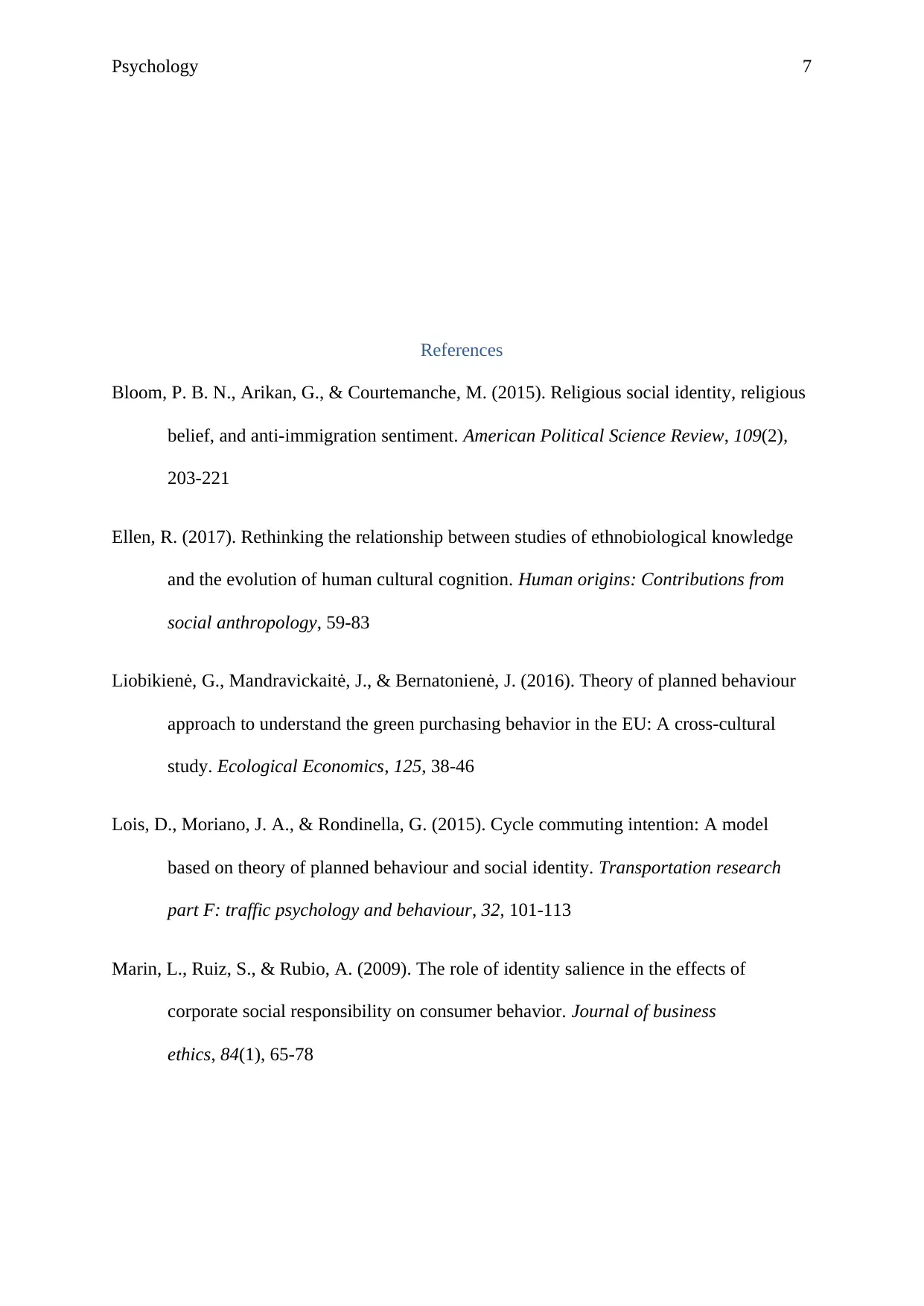
Psychology 7
References
Bloom, P. B. N., Arikan, G., & Courtemanche, M. (2015). Religious social identity, religious
belief, and anti-immigration sentiment. American Political Science Review, 109(2),
203-221
Ellen, R. (2017). Rethinking the relationship between studies of ethnobiological knowledge
and the evolution of human cultural cognition. Human origins: Contributions from
social anthropology, 59-83
Liobikienė, G., Mandravickaitė, J., & Bernatonienė, J. (2016). Theory of planned behaviour
approach to understand the green purchasing behavior in the EU: A cross-cultural
study. Ecological Economics, 125, 38-46
Lois, D., Moriano, J. A., & Rondinella, G. (2015). Cycle commuting intention: A model
based on theory of planned behaviour and social identity. Transportation research
part F: traffic psychology and behaviour, 32, 101-113
Marin, L., Ruiz, S., & Rubio, A. (2009). The role of identity salience in the effects of
corporate social responsibility on consumer behavior. Journal of business
ethics, 84(1), 65-78
References
Bloom, P. B. N., Arikan, G., & Courtemanche, M. (2015). Religious social identity, religious
belief, and anti-immigration sentiment. American Political Science Review, 109(2),
203-221
Ellen, R. (2017). Rethinking the relationship between studies of ethnobiological knowledge
and the evolution of human cultural cognition. Human origins: Contributions from
social anthropology, 59-83
Liobikienė, G., Mandravickaitė, J., & Bernatonienė, J. (2016). Theory of planned behaviour
approach to understand the green purchasing behavior in the EU: A cross-cultural
study. Ecological Economics, 125, 38-46
Lois, D., Moriano, J. A., & Rondinella, G. (2015). Cycle commuting intention: A model
based on theory of planned behaviour and social identity. Transportation research
part F: traffic psychology and behaviour, 32, 101-113
Marin, L., Ruiz, S., & Rubio, A. (2009). The role of identity salience in the effects of
corporate social responsibility on consumer behavior. Journal of business
ethics, 84(1), 65-78
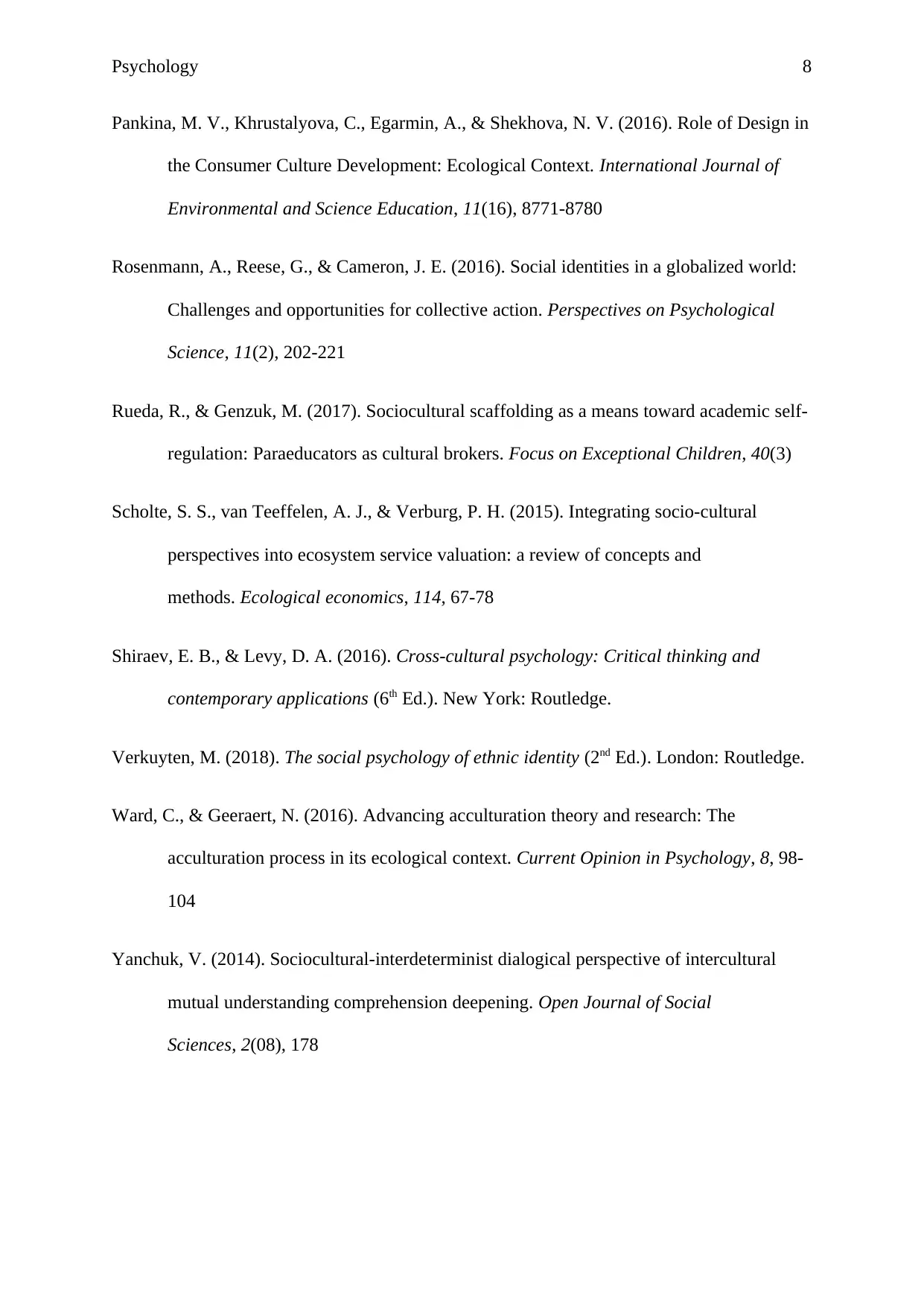
Psychology 8
Pankina, M. V., Khrustalyova, C., Egarmin, A., & Shekhova, N. V. (2016). Role of Design in
the Consumer Culture Development: Ecological Context. International Journal of
Environmental and Science Education, 11(16), 8771-8780
Rosenmann, A., Reese, G., & Cameron, J. E. (2016). Social identities in a globalized world:
Challenges and opportunities for collective action. Perspectives on Psychological
Science, 11(2), 202-221
Rueda, R., & Genzuk, M. (2017). Sociocultural scaffolding as a means toward academic self-
regulation: Paraeducators as cultural brokers. Focus on Exceptional Children, 40(3)
Scholte, S. S., van Teeffelen, A. J., & Verburg, P. H. (2015). Integrating socio-cultural
perspectives into ecosystem service valuation: a review of concepts and
methods. Ecological economics, 114, 67-78
Shiraev, E. B., & Levy, D. A. (2016). Cross-cultural psychology: Critical thinking and
contemporary applications (6th Ed.). New York: Routledge.
Verkuyten, M. (2018). The social psychology of ethnic identity (2nd Ed.). London: Routledge.
Ward, C., & Geeraert, N. (2016). Advancing acculturation theory and research: The
acculturation process in its ecological context. Current Opinion in Psychology, 8, 98-
104
Yanchuk, V. (2014). Sociocultural-interdeterminist dialogical perspective of intercultural
mutual understanding comprehension deepening. Open Journal of Social
Sciences, 2(08), 178
Pankina, M. V., Khrustalyova, C., Egarmin, A., & Shekhova, N. V. (2016). Role of Design in
the Consumer Culture Development: Ecological Context. International Journal of
Environmental and Science Education, 11(16), 8771-8780
Rosenmann, A., Reese, G., & Cameron, J. E. (2016). Social identities in a globalized world:
Challenges and opportunities for collective action. Perspectives on Psychological
Science, 11(2), 202-221
Rueda, R., & Genzuk, M. (2017). Sociocultural scaffolding as a means toward academic self-
regulation: Paraeducators as cultural brokers. Focus on Exceptional Children, 40(3)
Scholte, S. S., van Teeffelen, A. J., & Verburg, P. H. (2015). Integrating socio-cultural
perspectives into ecosystem service valuation: a review of concepts and
methods. Ecological economics, 114, 67-78
Shiraev, E. B., & Levy, D. A. (2016). Cross-cultural psychology: Critical thinking and
contemporary applications (6th Ed.). New York: Routledge.
Verkuyten, M. (2018). The social psychology of ethnic identity (2nd Ed.). London: Routledge.
Ward, C., & Geeraert, N. (2016). Advancing acculturation theory and research: The
acculturation process in its ecological context. Current Opinion in Psychology, 8, 98-
104
Yanchuk, V. (2014). Sociocultural-interdeterminist dialogical perspective of intercultural
mutual understanding comprehension deepening. Open Journal of Social
Sciences, 2(08), 178
⊘ This is a preview!⊘
Do you want full access?
Subscribe today to unlock all pages.

Trusted by 1+ million students worldwide
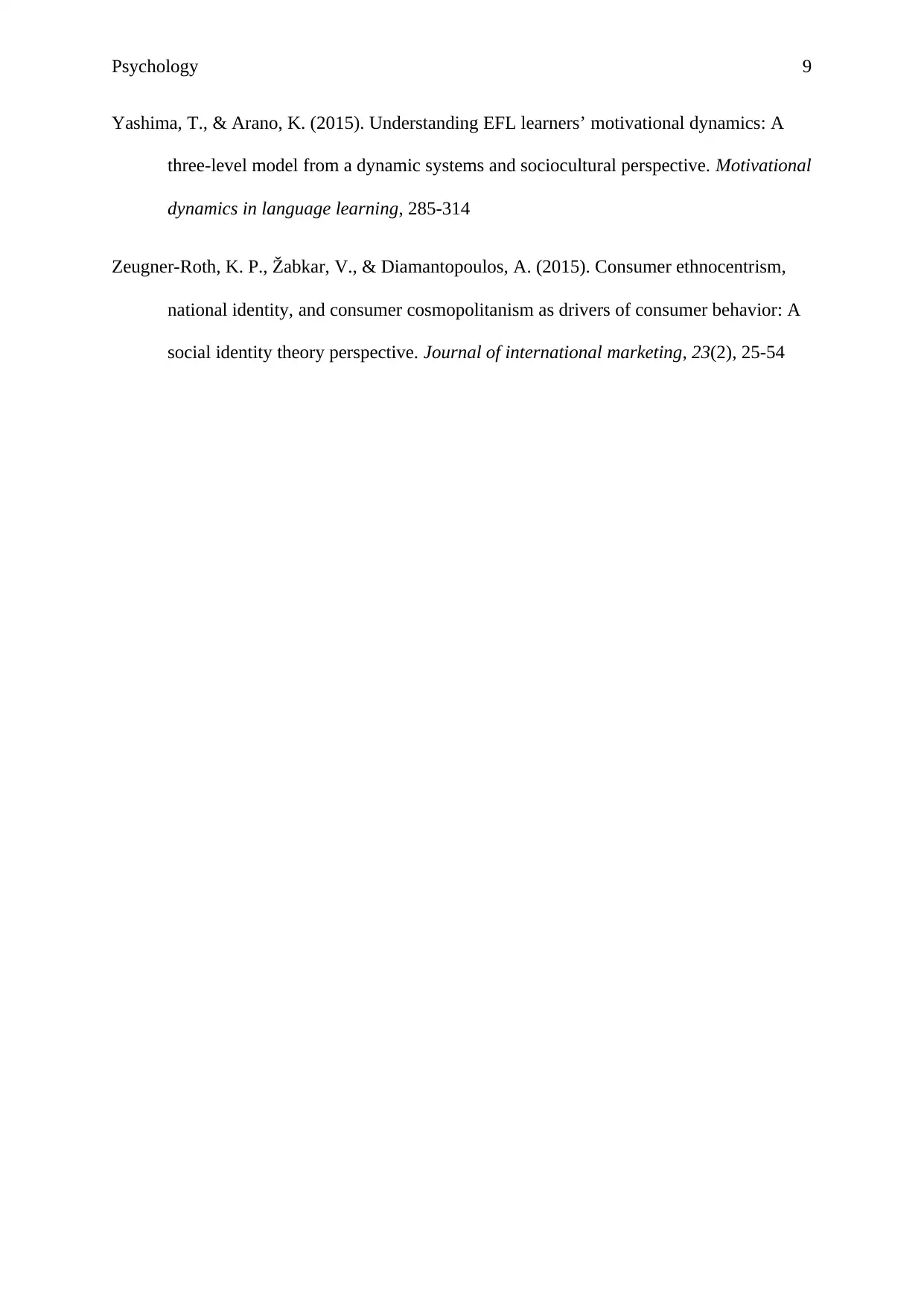
Psychology 9
Yashima, T., & Arano, K. (2015). Understanding EFL learners’ motivational dynamics: A
three-level model from a dynamic systems and sociocultural perspective. Motivational
dynamics in language learning, 285-314
Zeugner-Roth, K. P., Žabkar, V., & Diamantopoulos, A. (2015). Consumer ethnocentrism,
national identity, and consumer cosmopolitanism as drivers of consumer behavior: A
social identity theory perspective. Journal of international marketing, 23(2), 25-54
Yashima, T., & Arano, K. (2015). Understanding EFL learners’ motivational dynamics: A
three-level model from a dynamic systems and sociocultural perspective. Motivational
dynamics in language learning, 285-314
Zeugner-Roth, K. P., Žabkar, V., & Diamantopoulos, A. (2015). Consumer ethnocentrism,
national identity, and consumer cosmopolitanism as drivers of consumer behavior: A
social identity theory perspective. Journal of international marketing, 23(2), 25-54
1 out of 10
Related Documents
Your All-in-One AI-Powered Toolkit for Academic Success.
+13062052269
info@desklib.com
Available 24*7 on WhatsApp / Email
![[object Object]](/_next/static/media/star-bottom.7253800d.svg)
Unlock your academic potential
Copyright © 2020–2025 A2Z Services. All Rights Reserved. Developed and managed by ZUCOL.




